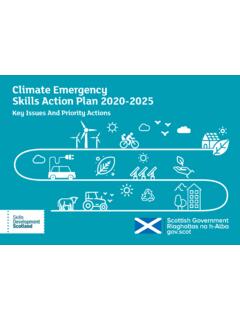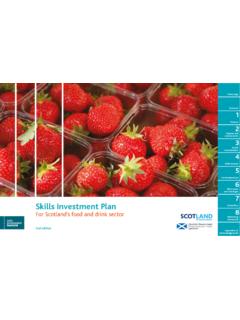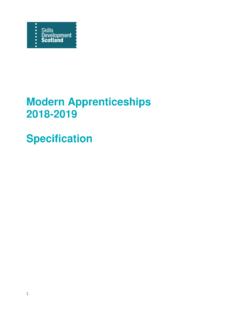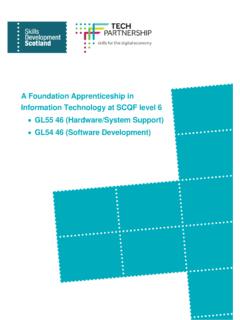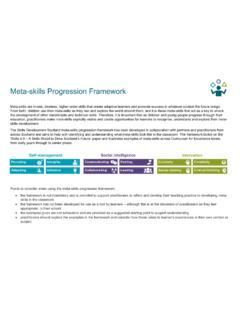Transcription of Skills Investment Plan - …
1 Skills Investment PlanFor edinburgh and South East ScotlandForewordThis is a time of real opportunity and change for the edinburgh and South East Scotland City Region. There is diverse employment and a growing business base with opportunities across a range of key sectors such as retail, tourism, financial services and health and social care. However in order to support continued economic growth and diversification it is vitally important to ensure that Skills supply is able to keep pace with demand, and that there are improved opportunities to support our citizens into and through employment. This is precisely what this Regional Skills Investment Plan is designed to remain a number of Skills areas which require further attention and these are addressed in this plan, and in the Integrated Regional Employability and Skills (IRES) programme, as part of the edinburgh and South East Scotland City Region Deal. For example, there is an increasing demand for higher level technical and professional level Skills in financial services, engineering and life sciences.
2 There is an increased need for digital Skills across all sectors and occupations to drive the economy forward and to support economic inclusion across disadvantaged communities. There are also persistent pockets of in-work poverty, under-employment and a recognised need to support individuals into more highly skilled jobs with improved pay. A closer integration of employability support across partners will play a critical role in addressing this. Angela Leitch Chair, Skills and Innovation Workstream group edinburgh and South East Scotland City Region DealStrong management and leadership Skills across a range of sectors will be important in prioritising Investment and supporting Skills development to generate inclusive and sustained growth. Although focusing on common challenges across the City Region, the Regional Skills Investment Plan also recognises certain distinct challenges across Local Authority areas as inhibitors on economic growth. There is, for example, slower population growth in the Scottish Borders and issues around limited transport connectivity to places of study and work across a range of rural areas.
3 There is a need to support older residents to stay in the labour market for longer and to consider how their Skills can continue to be best used to support effective workforce development and succession planning. This plan seeks to address these challenges by building on existing labour market intelligence, through a process of primary research across a range of partner organisations in the private and public sector to agree the mission, strategic outcomes and areas for action to best support Skills Investment moving forward. Through a series of workshops and one to one interviews, there is now a collective vision which aligns with the IRES programme and the wider aspirations of partners involved in the City Region Deal. Finally, flexibility and agility will be critical to the successful implementation of the plan, in light of significant changes in the external political and economic environment as a result of Brexit, further devolution of employability services, and changes emerging from the recent review of the Enterprise and Skills Agencies.
4 In response to this we have developed a governance model which builds on the foundation of regional partnership working through the evolution of the City Region Deal, and this will enable the successful delivery of the Regional Skills Investment Plan over the next three years. Scotland s Economic Strategy (Scottish Government, 2015) sets out the Scottish Government s purpose to create a more successful country, with opportunities for all of Scotland to flourish, through increasing sustainable economic growth and it has two key goals: increasing competitiveness tackling Strategy provides a framework (see Figure ) for the achievement of these goals, with actions targeted on four broad priority areas: investing in our people and our infrastructure in a sustainable way fostering a culture of innovation and research and development promoting inclusive growth and creating opportunity through a fair and inclusive jobs market and regional cohesion promoting Scotland on the international stage to boost our trade and Investment , influence and edinburgh and South East Scotland Regional Skills Investment Plan (RSIP) is designed to contribute to the delivery of Scotland s Economic Strategy, as well as other key national developments including.
5 The devolution of employability services from April 2017 the implementation of the 7 year Developing the Young Workforce approach the expansion of Modern Apprenticeships in Scotland to 30,000 starts in 2020, as well as developments of Foundation and Graduate Level Apprenticeships the increasing policy importance of the Inclusive Growth and Fair Work agendas the sectoral focus to economic development, which is reflected in the sector Skills Investment Plans the publishing of Scotland s first, long term Social Enterprise Strategy in December 2016. the publication of Phase 2 of the Enterprise and Skills Review in J u n e 2 is a need for ongoing analysis, and incorporation of key measures in the plan, to ensure strong alignment with the Scottish Government s Inclusive Growth agenda. The RSIP also has to respond to the Skills opportunities and challenges that emerge at the regional and local levels. There is a need for ongoing analysis, and incorporation of key measures in the plan, to ensure strong alignment with the Scottish Government s Inclusive Growth agenda.
6 In particular, the RSIP has sought to align with:1 Introduction Accelerating Growth the edinburgh and South East Scotland City Region Deal (detailed below), has been agreed with the UK and Scottish Governments the priorities of Community Planning Partnerships (CPPs) and their sub-groups. Flexibility has been built into the RSIP to enable it to respond to changing economic circumstances and policy contexts. The City Region Deal will continue to evolve and at the local level each CPP area will produce a Local Outcome Improvement Plan (LOIP) by October 2017. It will be important for the RSIP to be reviewed in light of these Growth the edinburgh and South East Scotland City Region DealThe six local authorities that make up the edinburgh and South East Scotland city region City of edinburgh , East Lothian, Fife, Midlothian, Scottish Borders and West Lothian have now secured a City Region Deal with the Scottish and UK Governments. billion of funding has been secured for culture, digital, housing, infrastructure, knowledge and innovation, and Skills .
7 The vision for the region that is set out in the City Region Deal is: In a fast-changing world we will create a region where Investment , intellect and culture will fuse to create new ways of doing things. In the next 20 years the edinburgh and South East Scotland City Region will become the most connected, creative, inclusive and entrepreneurial place in Europe. We will build a network of businesses, universities, technical and creative Skills attracted by a great lifestyle and cultural offer. PurposeCompetitivenessTackling InequalityIncreasing growth and tacklinginequality aremutually supportiveInvestmentInnovationInclusive GrowthInternationalFigure - Scotland s Economic Strategy frameworkTo deliver on this vision, key strands of the City Region Deal are: building on the region s strengths in areas of knowledge, culture and technology through increased innovation across the finance, science, culture, leisure, tourism, learning and technology sectors.
8 Proposals include: - develop a regional network of incubator facilities - increase regional collaboration to expand overseas trade - invest to protect and enhance the world famous culture and leisure assets in the region, including the edinburgh Festivals - develop advanced digital technology to support business and culture developing an integrated regional employability and Skills (IRES) programme to increase opportunities for learning and development for everyone (see Figure ) investing in infrastructure to support economic growth by: - developing a clear and integrated regional infrastructure strategy with all public sector partners establishing an infrastructure fund that would provide the means to accelerate growth and address the affordability barrier for local authority partners based on existing funding edinburgh and South East Scotland Regional Skills Investment Plan (RSIP) is one of the eight projects outlined in the IRES programme and contributes to IRES Theme 1 Labour Market Analysis.
9 However, while the RSIP is one of the current IRES projects, partners agree that the RSIP has a wider strategic purpose. To explain: the RSIP has processes and projects within its 3 year Action Plan that are additional to the projects which are seeking funding in the current IRES programme certain activities in the RSIP can progress without City Region Deal agreement and funding but does highlight the current IRES projects which are dependent on City Region Deal funding for deliver y. The RSIP has been commissioned by Skills Development Scotland (SDS) and the City Region Deal Skills and Innovation Workstream1, which includes the six local authorities, DWP, college sector and university sector. Its development process has involved: analysis of current and future employment and Skills demands alongside the current and predicted labour supply, drawing on the in-depth analysis provided by SDS Regional Skills Assessments (RSAs) review of key policies impacting on Skills and employment in the region 1 The City Region Deal Skills and Innovation workstream is chaired by East Lothian Council1 Introductioncontinued Structure of the Regional Skills Investment PlanThe RSIP is organised into the following sections.
10 Labour Market Demand in edinburgh and South East Scotland analysing the current and future demand for labour in the region Labour Market Supply in edinburgh and South East Scotland analysing the current and future supply of labour in the region Skills Priorities and Principles for edinburgh and South East Scotland setting a framework for the RSIP s mission, strategic outcomes and areas for action Mission, Strategic Outcomes and Areas of Action setting out the ambitions of the RSIP Action Plan for 2017-2020 detailing the specific actions that the RSIP will deliver on in the next three years Governance setting out proposals for how the RSIP is most effectively governed. consultations with key Skills partners across the region through individual interviews and (where appropriate) group sessions workshop sessions with the City Region Deal Skills and Innovation Workstream to discuss and agree the mission, strategic outcomes and actions of the has led to an evidenced-based RSIP that: sets out the vision, ambitions and aspirations for the edinburgh and South East Scotland region for the next 20 years in terms of Skills and employment provides a detailed 3 year Action Plan, drawing on evidence and partner RSIP outlines the actions that will be taken at the regional level.
